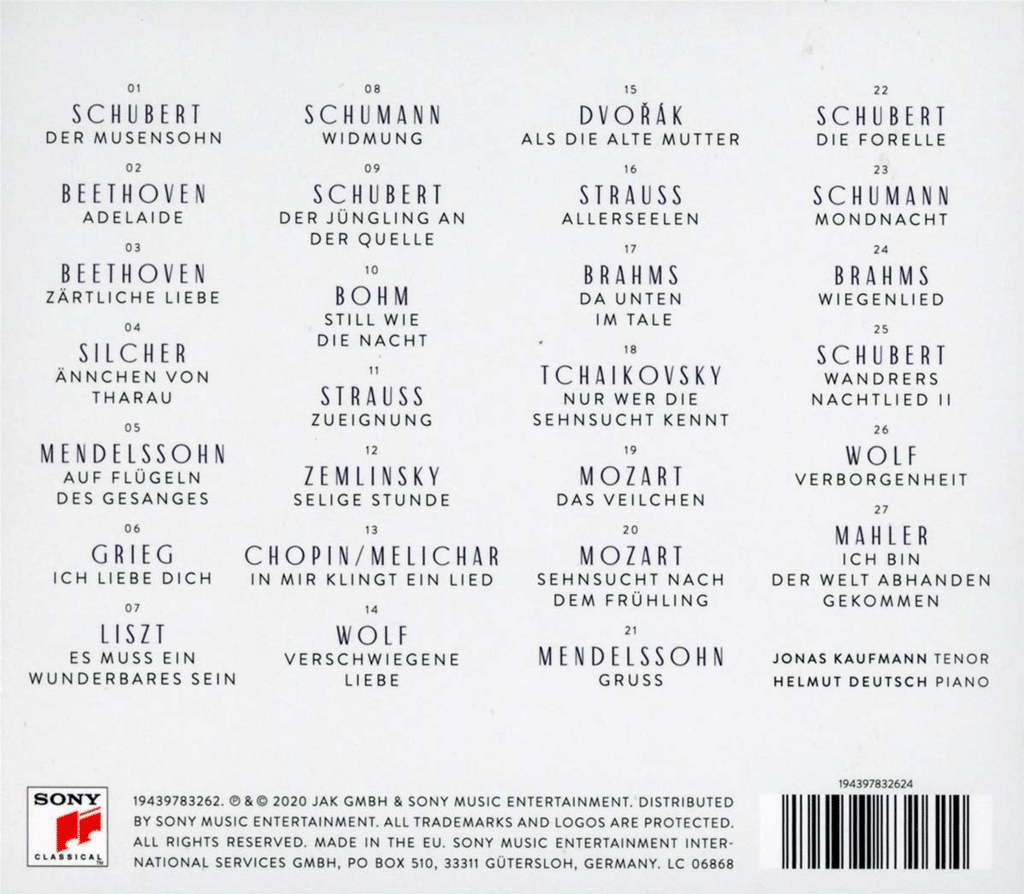
Not all singers are lucky enough to have Jonas Kaufmann who only has to lift a finger to have his wishes granted. For not everyone can afford to record a programme of German Lieder in full confinement, but stars, provided they know how to bend to certain commercial obligations and accept a few concessions (such as that of burning a CD devoted to Christmas carols!!!) can have some satisfaction. We know that the art of the Lied is not a coquetry for Jonas Kaufmann who has always privileged the recital, to return to its fundamentals, between two lyrical productions. With Harmonia Mundi long before his fame (the Strauss album with Deutsch already in 2006), with Decca (Die schöne Müllerin) and today with Sony, the famous tenor has never denied his first loves, defending with the same meticulous craftsmanship, these individual miniatures or those gathered in a cycle, defying the prohibitions by even taking the right to sing Strauss's Vier letzte Lieder (in recital only, the orchestral version conducted with Antonio Pappano having failed to be issued) and the complete Das Lied von der Erde by Mahler (with Jonathan Nott by Sony).
Close to the music that has accompanied him since his childhood and to the poems with which he has surrounded himself, Kaufmann has the culture of the Lied, as well as that of the oratorio. Where the stage allows him to develop a character lengthwise, the melody requires him to tell a story in just a few minutes, and that doesn't scare him. The exercise is frightening, but the greatest who have distinguished themselves before him, from Schwarzkopf to Fischer-Dieskau via Prey, Seefried or Wunderlich, shared the same abilities alone with their pianists, facing a real (in the auditorium) or virtual (in the studio) audience.
For this "Selige Stunde", the duo Kaufmann/Deutsch drew from the vast pool of German melody, taking hits here, rarities there. Schubert, who was present four times all the same, came out on top with a lively, almost boastful 'Musensohn' opening, a spiritual 'Forelle', a whispered 'Wandrers Nachtlied II', but above all a divine lullaby sung on a thread of voice ready to break, 'Der Jüngling an der Quelle'. The way in which he detaches each syllable to make them click "Adelaide", the clear articulation of Beethoven's "Zärtliche Liebe", this song on the lips, which was long the prerogative of Fischer-Dieskau ("Es muss ein Wunderbares sein" by Liszt), provide irresistible auditory sensations. The "Still wie die Nacht" by the unknown Carl Bohm, pianist and composer born in 1844 and died in 1920, based on a beautiful traditional poem of lost love, allows him to sing at his heart's content and to alternate this valour with Brahms' poetic and ethereal "Wiegenlied", Schumann's immaterial "Mondnacht", or further on with Brahms' "Da unten im Tale", interpreted in the simplest and most natural way possible. Zemlinsky's melody that gives the album its name is superb, like Tchaikovsky's "Nur wer die Sehnsucht kennt" on a text by Goethe, also used by Wolf (Mignon II), but the tenor touches the sublime in Strauss's "Allerseelen", where each intonation adds to the quality of expression and reinforces the painful evocations of the past that the narrator recalls with the repeated phrase "Wie einst in Mai". As we have said, Wolf is an admirer of Schubert, whose "Schwanengesang" he has yet to tackle, and of Schumann, whose closeness he cannot hide, and should not resist him for much longer ; for listening to the two melodies chosen from this collection, "Verschwiegene Liebe" and "Verborgenheit", leaves no doubt as to the marvellous symbiosis between the performer and the composer. Inspired by the power of the lyrics and the maniacal, penetrating precision of this music – admirably rendered like the whole of this album by Helmut Deutsch, pianist and sound magician extraordinaire – Jonas Kaufmann should explore the world of Wolf alone to make people forget his disappointing Italienisches Liederbuch with Diana Damrau (EMI 2018). Stripped at last of all the attributes of his power, his ability to move and the theatre that he is able to summon by the beauty of his voice and his unique timbre, the tenor, supported by his fetish accompanist, moves forward and then seems to disappear into the distance "Alone in his sky, in his love and in his singing" on the last chords of "Ich bin der Welt abhanden gekommen" from Mahler's suffocatingly beautiful Rückert-Lieder. A CD that cannot be ignored.

